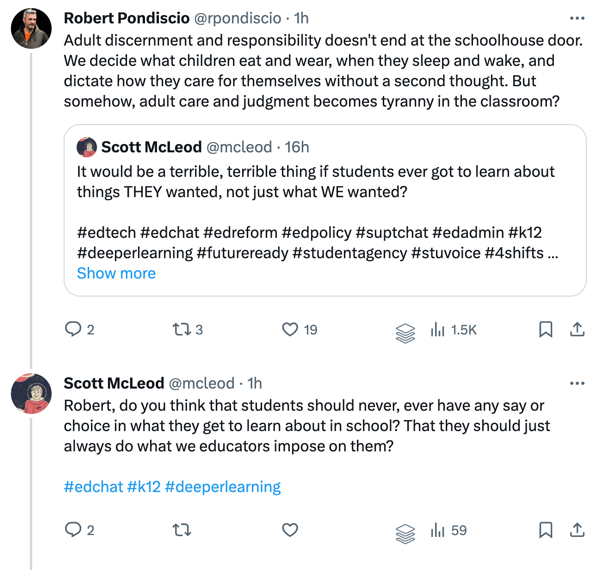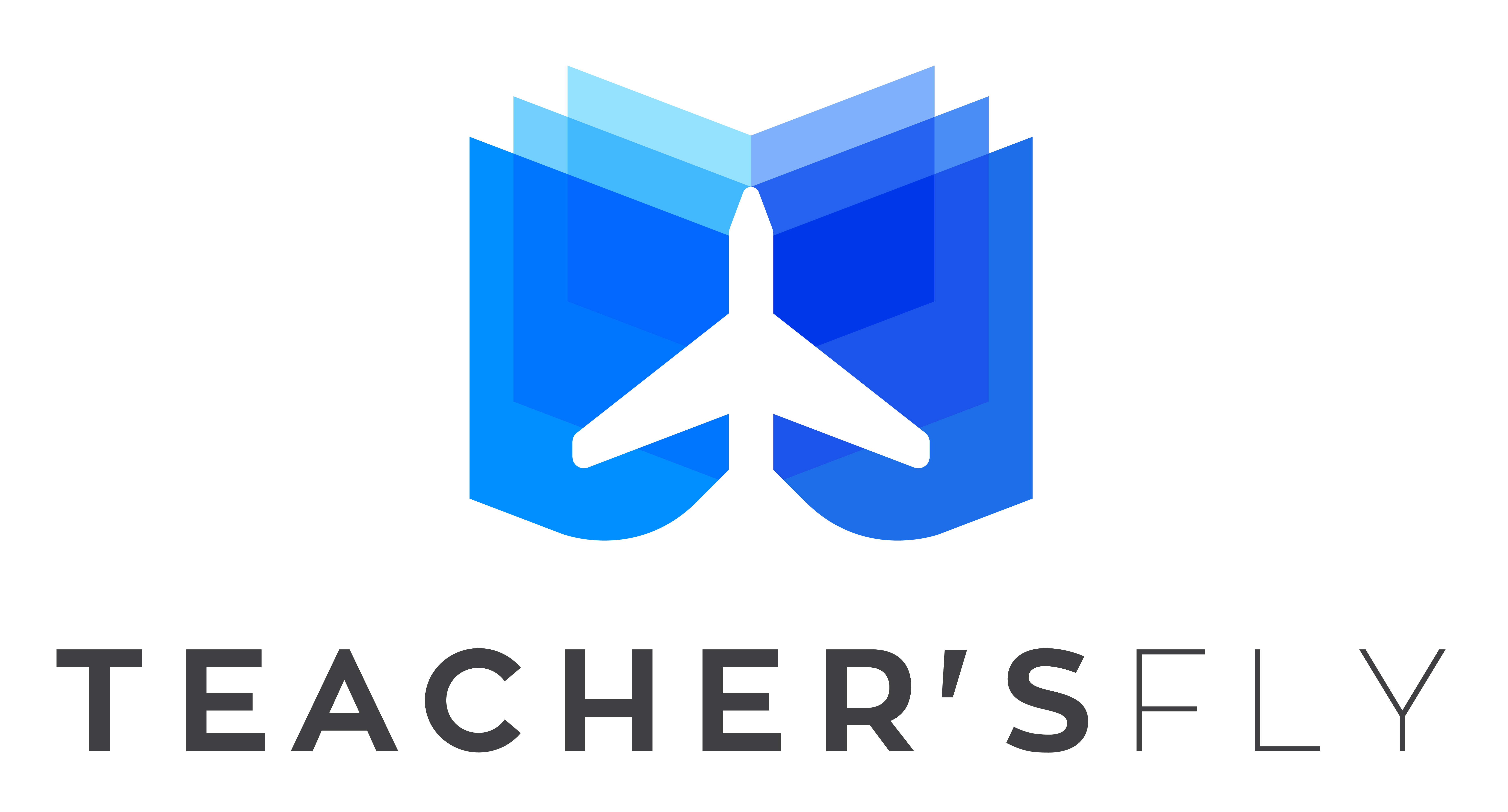
17 Jan Students don’t need agency
I’m going to leave these screenshots here so I don’t forget them… [sigh] Text is underneath each one.


ME: It would be a terrible, terrible thing if students ever got to learn about things THEY wanted, not just what WE wanted?
THEM: Adult discernment and responsibility doesn’t end at the schoolhouse door. We decide what children eat and wear, when they sleep and wake, and dictate how they care for themselves without a second thought. But somehow, adult care and judgment becomes tyranny in the classroom?
ME: Do you think that students should never, ever have any say or choice in what they get to learn about in school? That they should just always do what we educators impose on them?
THEM: With respect, your use of the word “impose” betrays a doctrinaire POV (and a set of assumptions) that can only make this conversation unfruitful and unsatisfying.
ME: What verb would you like me to use instead that describes us always deciding what students do and learn instead of sometimes letting them make some choices?
THEM: Teaching.


THEM: No as this would not work for science, students have to learn things that make them uncomfortable, that they find difficult, that they don’t like. Novices aren’t good at having the expertise of deciding what is important about their subject matter.
ME: Whatever happened to scientific inquiry and the scientific method? Not for students, I guess. Understanding Scientific Inquiry Just teach them ‘science’ without engaging them as actual scientists… Inquiry in Science and in Classrooms
THEM: How did the very best scientists learn their science? Novices aren’t experts and only experts can apply the scientific method. Children are not scientists, they wouldn’t be doctors if I gave them a stethoscope and set them off treating patients in a hospital.
ME: “only experts can apply the scientific method” Huh. Our National Research Council and National Science Teachers Association here in the U.S. both disagree with you. But I’m sure you know better than they do…
THEM: Do you think that children having stethoscopes and being in a hospital makes them doctors? Americans can be wrong about thinks, just look at your approach to guns and healthcare sure. Or because they’re American ideas it’s fantastic?
ME: No, I’m absolutely sure that you’re right and that the United States National Research Council and our National Science Teachers Association are both wrong. Must be nice to be so much more brilliant than all of our dumb scientists!

THEM: A luxury belief stated by someone with the benefit of an education not chosen by a child
ME: It’s a luxury belief to feel that sometimes children should get to learn about what they want, not just what we want to impose on them? #yikes
THEM: Occasionally. A small number of elective courses in high school makes sense.

THEM: Amazing that the ed field’s ‘experts’ continue to produce ideas like these, isn’t it?
ME: It’s ‘amazing’ that educators know the research on self-determination, autonomy, and agency and the concurrent impacts on human motivation and engagement?



 ORIGINAL TWEETER: The six stages of belief in inquiry learning 1. Students learn better this way 2. Students learn better but not in a way that shows up on standardised assessments 3. OK explicit teaching is better for some basic things but inquiry learning is more motivating, right? 4. I have been doing this for years and I cannot have been doing the wrong thing all that time because I’m a good person who means well, right? …. …. 5. Maybe I’ll take a look at explicit teaching. 6. Why did I not know about this before!
ORIGINAL TWEETER: The six stages of belief in inquiry learning 1. Students learn better this way 2. Students learn better but not in a way that shows up on standardised assessments 3. OK explicit teaching is better for some basic things but inquiry learning is more motivating, right? 4. I have been doing this for years and I cannot have been doing the wrong thing all that time because I’m a good person who means well, right? …. …. 5. Maybe I’ll take a look at explicit teaching. 6. Why did I not know about this before!
ME: It would be a terrible, terrible thing if students ever got to learn about things THEY wanted, not just what WE wanted?
THEM: This is a fun way to reframe of what [he] posted, it doesn’t reflect the actual words he wrote though.
ME: His 4th stage literally says inquiry learning is “doing the wrong thing?”
ORIGINAL TWEETER: I know, right?
ORIGINAL TWEETER: You cannot *include* explicit instruction in an inquiry learning approach, at least not if you are using the form of explicit instruction that is backed by research. Why? Because it is a *whole system* that starts with teacher explanation/modelling and then gradually releases control to students. I do -> we do -> you do

THEM: I mean, no one is suggesting that kids not be allowed to pursue their own interests. They have a good 6 hours a day for that, plus summers and weekends. And sure, let them pick electives, genius hour projects, essay theses, etc. But are you seriously saying we should let kids make up the curriculum in schools?
Related Posts
I’m going to leave these screenshots here so I don’t forget them… [sigh] Text is underneath each one. ME: It would be a terrible, terrible thing if students ever got to learn about things THEY wanted, not just what WE wanted? THEM: Adult discernment and responsibility doesn’t end at the schoolhouse door. We decide what Learning and Teaching, learning, student agency, teachingRead More
Learning and Teaching, learning, student agency, teachingRead More

Sorry, the comment form is closed at this time.